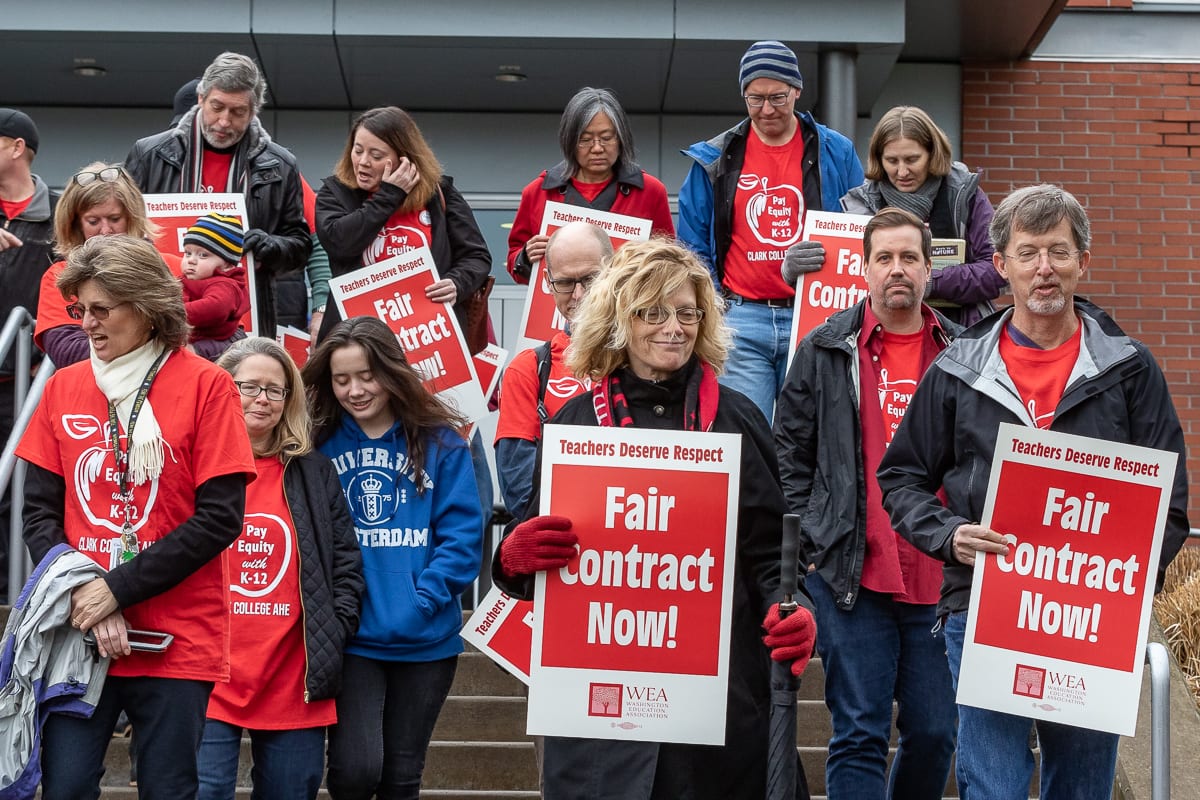Both sides will continue meeting over the weekend
VANCOUVER — It appears the 13,000 students who attend Clark College will get a day off Monday, but not because of snow. At least not yet.

Nearly 400 full- and part-time educators represented by the Clark College Association of Higher Education (CCAHE) declared Friday evening that they will walk off the job on Monday, after failing to reach agreement on a new contract after several hours of meetings on Friday.
It is the first time Clark College has faced a labor strike in the school’s 88-year history.
“We are fighting for a fair contract that provides competitive pay for ALL Clark College faculty, including equitable pay for our part-time professors,” said Suzanne Southerland, a communications professor and president of the CCAHE in a release announcing the strike. “Clark instructors and professors appreciate the tremendous support from our students, the community, college staff and other unions.”
“I regret the impact this will have on our students,” said interim President Sandra Fowler-Hill in a release Friday evening. “I am committed to working with faculty to get students back in class.”
Fowler-Hill said the school will remain open next week to provide support services to employees and students.
“To students, we are committed to ensuring you are able to successfully complete your winter quarter studies,” she added. “It is our highest priority to find an agreement with faculty, end this contract dispute and move forward.”
Both sides plan to continue meeting over the weekend, though it’s unclear whether classes could resume on Monday even if a deal is reached.
It’s also unclear if the planned strike will impact the school’s plan to begin hosting the four finalists to replace Bob Knight, who retired as Clark College president last year. The first forum, for Dr. Sara Thompson Tweedy, vice president of student access, involvement, and success at SUNY Westchester Community College in New York, was scheduled to take place Tuesday.
Dr. Karin Edwards, president of the Cascade Campus of Portland Community College was scheduled to be at the campus on Friday, Jan. 17, with the other two candidates set for the following week.
Prior to last year, pay for community college employees in Washington state was negotiated at the state level. In 2018, the legislature allowed faculty to bargain for their own salaries, outside of a yearly cost of living increase which is funded by the state.
That has led to unrest at nearly a dozen community colleges statewide, with administration blaming state lawmakers for putting them in a bind by allowing for local negotiations without providing a funding increase.
With K-12 educators receiving sometimes double-digit percentage raises last year, educators at Clark College and other community colleges say they’re falling further behind when it comes to compensation.
At Clark College, a tenured faculty member working full-time tops out at just over $76,000 a year. The top yearly wage for educators at nearby Evergreen or Vancouver school districts can top out well over $90,000. Portland Community College has a top-end pay scale at just over $90,000.
The other issue remaining is parity for part-time faculty. CCAHE has asked for part-time educators to receive at least 75 percent of the pay full-time faculty receive. The most recent offer released by the college would increase part-time pay to 73 percent for associates and affiliates, with adjuncts receiving 70 percent. The increase would happen starting retroactive to July of last year, and happen over the next five years.
The other proposed option was a 6 percent flat raise for part-timers.
Full-time employees have been offered a 1 percent raise retroactive to the 2018-19 school year, and 4 percent for 2019-20.
Clark College currently has an operating budget of $73.2 million, 86-percent of which is dedicated to employee salaries and benefits, according to an FAQ posted on the college’s website.
The college argues tuition revenue fell nearly $400,000 last year, owing to a seventh consecutive year of enrollment declines. They argue that during that same period they have experienced increases in operational expenses, such as Classified staff increments, tenure promotions, and increases in the cost of healthcare and retirement benefits.
Even after a deal is reached, both sides will need to return to the bargaining table in May to work out a new contract for next school year and going forward.
Under state law it is illegal for a state employee to go on strike. At this point the school has said no decision has been reached about whether to seek a court injunction to force employees back to work. Clearly, no such decision would be reached until sometime next week at the earliest.
Clark County Today has reached out to Clark College officials and will update this story as more information comes in.




